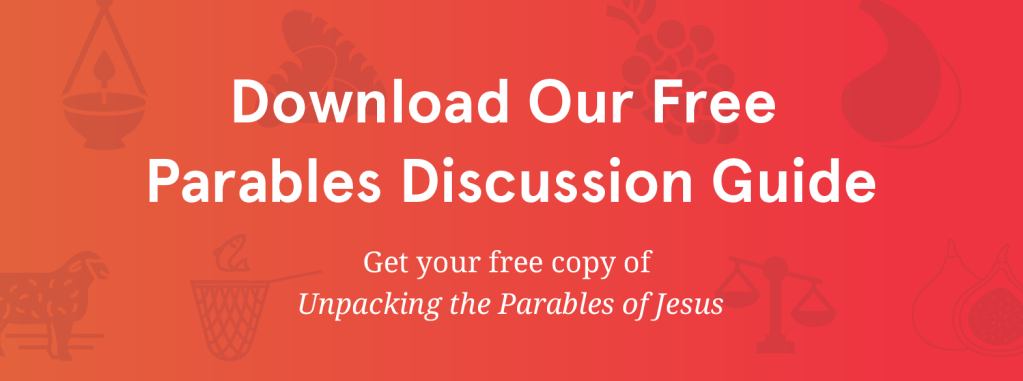About halfway through Matthew’s Gospel, Jesus offers a parable about shepherding:
What do you think? If a man owns a hundred sheep, and one of them wanders away, will he not leave the ninety-nine on the hills and go to look for the one that wandered off? And if he finds it, truly I tell you, he is happier about that one sheep than about the ninety-nine that did not wander off. In the same way your Father in heaven is not willing that any of these little ones should perish (Matthew 18:12-14).
And if we want to understand this parable, we need to take a step back and take a look of the context.
The greatest in the kingdom of heaven
The disciples are just like anyone else. Throughout the Gospels, we see them wrestle with fear, grief, and lack of faith. They also jockey for position and compete for Jesus’s attention.
Who can forget the time James’s and John’s mom came to ask Jesus for a special favor?
Then the mother of Zebedee’s sons came to Jesus with her sons and, kneeling down, asked a favor of him.
“What is it you want?” he asked.
She said, “Grant that one of these two sons of mine may sit at your right and the other at your left in your kingdom.”
“You don’t know what you are asking,” Jesus said to them (Matthew 20:20-22a).
Luke also tells us that the disciples argued about which of them was the greatest (Luke 9:46). In this instance, the disciples wanted to know who would be greatest in the kingdom of heaven.
Jesus called a child over and said, “Truly I tell you, unless you change and become like little children, you will never enter the kingdom of heaven. Therefore, whoever takes the lowly position of this child is the greatest in the kingdom of heaven. And whoever welcomes one such child in my name welcomes me” (Matthew 18:3-5).

Leading a small group or Bible study?
Download a free copy of Unpacking the Parables of Jesus. This guide is packed with the necessary tools to lead your group through an insightful discussion of Jesus’ parables. You’ll find critical insights and thoughtful questions to help guide your group through Jesus’ essential teachings. You’ll also receive our bi-weekly JFP News, packed with films and resources to help you share Jesus’ story with the world.
Children and the great reversal
Like women and slaves, children weren’t given a lot of respect in first-century Jewish society. They didn’t have any rights and were considered possessions of their parents. Obviously, Jewish parents loved their children, but it was a culture where they were to be seen and not heard-and preferably not seen.
Jesus intentionally used a child to communicate the values of the kingdom. Not only had He come to rescue humanity from sin and death, but He also wanted us to understand that the principles of the kingdom would eventually reverse this world’s values:
- The last will be first, and the first will be last (Matthew 20:16).
- Instead, whoever wants to become great among you must be your servant, and whoever wants to be first must be your slave (Matthew 20:26-27).
- Those who exalt themselves will be humbled, and those who humble themselves will be exalted (Matthew 23:12).
- He has brought down rulers from their thrones but has lifted up the humble. He has filled the hungry with good things but has sent the rich away empty (Luke 1:52-53).
In Christ’s economy, those who are willing to take the lowest position of humility (become like a child) are the greatest in the kingdom of heaven. This is why Jesus launches into a lesson about God’s wrath towards any who would take advantage of or lead these innocent ones astray (Matthew 18:6-9).
Chasing wandering sheep
It’s in this context that Jesus shares the parable of the wandering sheep. On its face, it’s a quizzical lesson. From the world’s perspective, it would be crazy to leave your sheep on the hills unattended to go find the one that’s wandered off on its own. But in God’s economy, you don’t write the vulnerable off.
It’s clear that Jesus is still talking about children here, because he finishes the parable by reiterating that God “is not willing that any of these little ones should perish” (Matthew 18:14). The ultimate point is that there are some categories of people that the world dismisses as insignificant, but God doesn’t share that sentiment.
He’s willing to leave 99 healthy and contributing members of society to go off looking for one stray child. He’s willing to spend time with those whom the world has written off: sinners, prostitutes, tax-gatherers, Romans. He’s willing to leave His throne to come and rescue a depraved and rebellious planet.
When the disciples ask the Lord who is greatest in the kingdom of heaven, the answer is clear. The greatest are those who understand that ranking people by worth is a reflection of worldly values. All people matter to God, and there’s a sweetness in knowing that the kingdom’s greatest demonstrate this in their own lives.
If you’re interested in learning more about Jesus’ parables, check out the article All the Parables of Jesus.
All Scripture references quote the New International Version unless otherwise noted.
